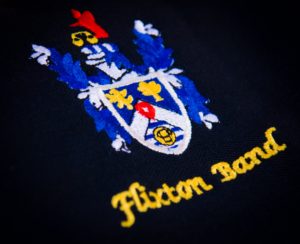 Flixton Band maintains a proud tradition of music making, which dates back over 140 years. The Band is currently graded first section by the National Brass Band Association of Great Britain, the highest of any Trafford Band. Flixton Band is currently self-funding and does not benefit from sponsorship.
Flixton Band maintains a proud tradition of music making, which dates back over 140 years. The Band is currently graded first section by the National Brass Band Association of Great Britain, the highest of any Trafford Band. Flixton Band is currently self-funding and does not benefit from sponsorship.
Originally formed in 1877, the Flixton Volunteer Band was the result of the formation of the Flixton 1st Volunteer Battalion, Manchester Regiment. (This was the Territorial Army of the period.) The services of the band were in much demand and it gradually became known locally as the Flixton Volunteers Band. The band was on duty to play when the Manchester Ship Canal was opened by Queen Victoria in 1894. The band became an important fixture within the local community, performing at church events, cricket matches, garden parties, flower shows, and other local events. In 1908, with the termination of the Volunteers, the band became known as the Flixton Brass Band. The depression of the 1930’s took it’s toll, and in 1933, with many players leaving the area to find work, and people not having enough spare time, the band disbanded. Some of the instruments were held in trust in the hope that the band would be reformed at a future date.
The band re-formed in 1967, when it became known as the Flixton Silver Band, and was granted permission to use the Urmston coat of arms on band uniforms and stationery. Since then, the band has broadcast on radio and television, and taken part in events locally, nationally, and internationally.
In 1981 the band travelled to West Germany (as it was) and gave a number of well received concerts. At the end of 1988 it was decided to remove the word Silver from the band’s name, and to resume contesting.
In June 1993, the band travelled to Denmark for a concert tour, including performance at the Tivoli Gardens. The band was awarded a National Lottery Grant in 1998, that helped to buy new instruments and equipment.
In 2012 the band registered as a charity and the following year a training band was formed with instruments purchased from a generous donation by the Urmston Housing Society. This training band was renamed the Flixton Community Band and has taken public engagements since late 2013.
From late 2001 until Easter of 2013, with the help of Trafford Council, Flixton Band moved into The Old Library, Flixton. Since then, the band have rehearsed in various venues in Flixton, including the Flixton Junior School, John Alker Club and the Cricket Club. The band now resides at the Coach House in Flixton.
The Flixton Band is currently a subscription band, and does not have the luxury of any sponsorship. The band is supported entirely through members’ weekly subscriptions, engagement fees and prize money. Potential sponsors of the band are always welcome!
Take a trip down memory lane, visit our Photo Gallery >
Learn More about Contesting Here >
Do you have any historic Flixton Band memorabilia?
If you have any item or information relating to Flixton Band history, and are willing to donate or lend to our archives, please contact us.
The Urmston Coat of Arms
The band re-formed in 1967, when it became known as the Flixton Silver Band, and was granted permission to use the Urmston coat of arms on band uniforms and stationery. To this day we still use the coat of arms in association with our band.
 The emblem of St. Michael, martlets, a squirrel, a chevron, an anvil, an oak tree, a rose, and a griffin, all have a prominent position in the Arms of Urmston, and naturally in its history. The Arms were granted to the Council by the College of Arms on June 10th, 1942. In them, we can trace not only the history of the district, but also its links with many ancient families: the griffin from the Arms of the Traffords, the chevron and the martlets from the Hydes and Asshawes, the squirrel from the Ormestons. The Parish Church of Flixton is dedicated to St. Michael, whose emblem (the scales) thus appears.
The emblem of St. Michael, martlets, a squirrel, a chevron, an anvil, an oak tree, a rose, and a griffin, all have a prominent position in the Arms of Urmston, and naturally in its history. The Arms were granted to the Council by the College of Arms on June 10th, 1942. In them, we can trace not only the history of the district, but also its links with many ancient families: the griffin from the Arms of the Traffords, the chevron and the martlets from the Hydes and Asshawes, the squirrel from the Ormestons. The Parish Church of Flixton is dedicated to St. Michael, whose emblem (the scales) thus appears.
The anvil is there to signify industry, while the wavy bars indicate close ties with rivers, in this case the Mersey and the Manchester Ship Canal (the latter being in part, the canalised Irwell. The oak tree is a strong reminder of the woodlands and copses with which the district still abounds. The Lancashire rose needs no explanation. Translated, the motto reads: ” The Welfare of the People is the Supreme Law. ”
Memorable Moments
Alan Kelly (1972-Present)
“In 1994 the band competed at the Fleetwood contest in the local Championship Section. We won the contest, and in doing so, I was able to complete the personal goal of having won at every level of competition with Flixton Band”
Mike Rowley (1973 – 1977 & 1988 – 2010)
“1993 – Denmark Tour- The band had travelled to Denmark as the guests of The Chapean Band (who themselves had visited Flixton 2 years previously). Flixton Band was then riding on the crest of a very successful wave, having been runners up at the previous year’s National Finals. The band gave a number of concerts during the week, including one at the Tivoli Gardens in Copenhagen.
The final night saw the band give a joint concert with Chapean. Flixton performed the second half. It was an unbelievable performance by the band, who that evening attained a standard of playing that has never been improved upon since.
The concentration among the players was incredible, the playing brilliant, and the longer the band played, the better they became. What a night!!!!
1998 – National Lottery Grant- Flixton was awarded a National Lottery Grant of £50574 to purchase new instruments. This was the culmination of 2 years hard work, and enabled the band to have top class equipment for the first time in its history. In addition to being the only Brass Band that successfully applied within Trafford, the band was also one of the first organisations within Trafford to secure a National Lottery Grant. The atmosphere at the rehearsal when all the instruments arrived was like Christmas morning. Although the instruments have since been replaced with a new set, and there has been a lot of hard admin work carried out by a few dedicated band officials, all involved will agree, it was worth the effort.
2003 – Playing Paganini Variations at The Brass at The Guild Contest, Preston. After returning to the new Bandroom at Flixton in November 2001, the band had struggled for players. By March 2002 there were only 5 players remaining. Refusing to give up, and against all the odds, the five set about trying to rebuild the band. Hardly any players or conductors would join as, to them, the situation seemed hopeless. Gradually, however players started to come along and we found a committed conductor in Ewan Campbell. At the contest, in February 2003 (Still without a full band, and with new players joining as late as 3 days before) we played Paganini Variations, which is regarded as one of the most demanding contest pieces in the Brass Band repertoire. The players gave a very creditable performance.Flixton Band had turned the corner. Look at us now, what a fantastic bunch of people, and what a great band to be in!!”





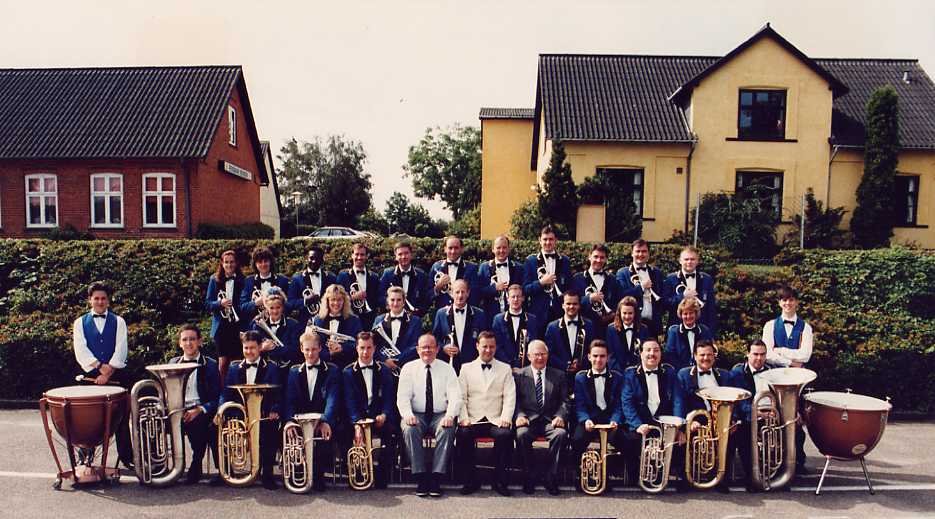

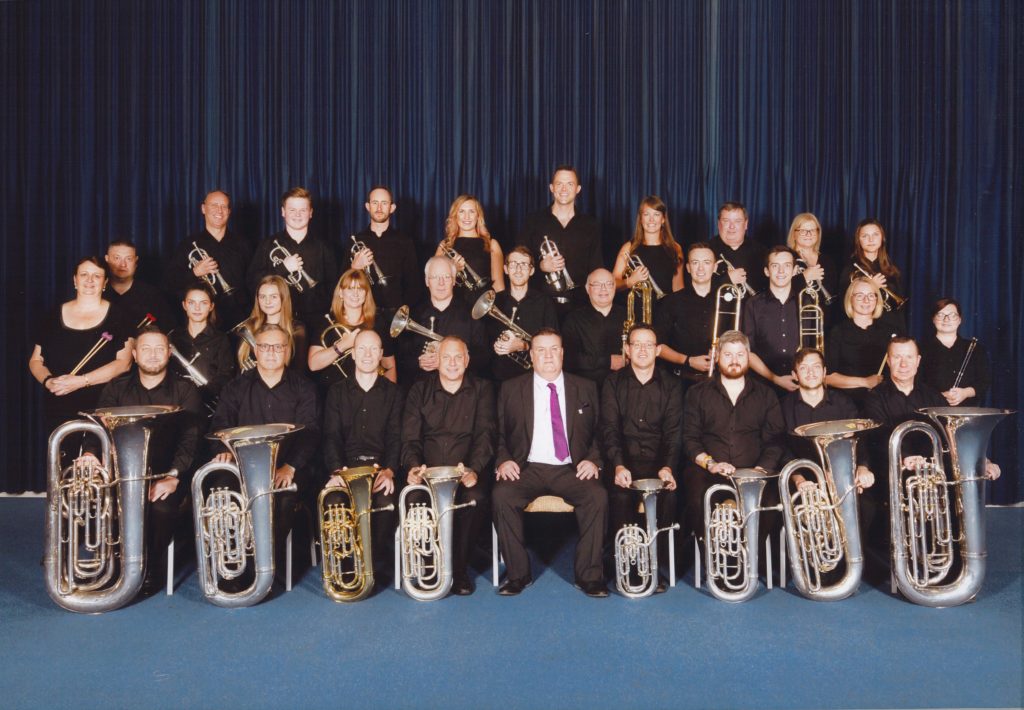
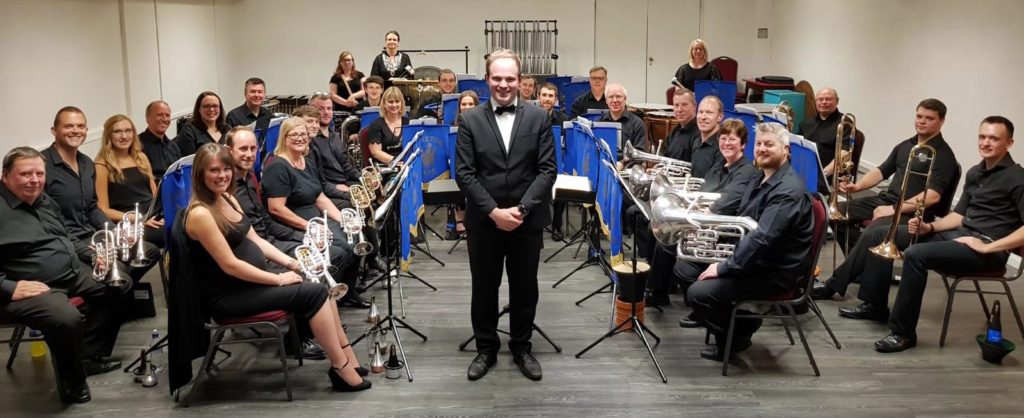
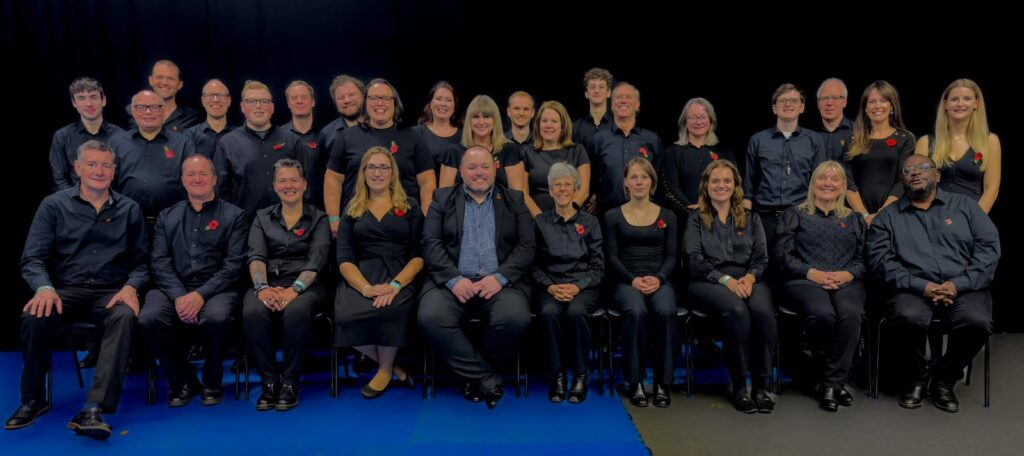
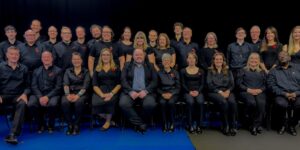
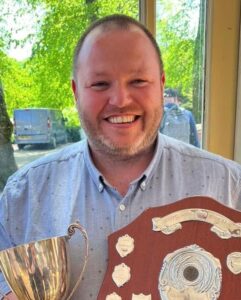 Adie Smith is our Musical Director.
Adie Smith is our Musical Director.